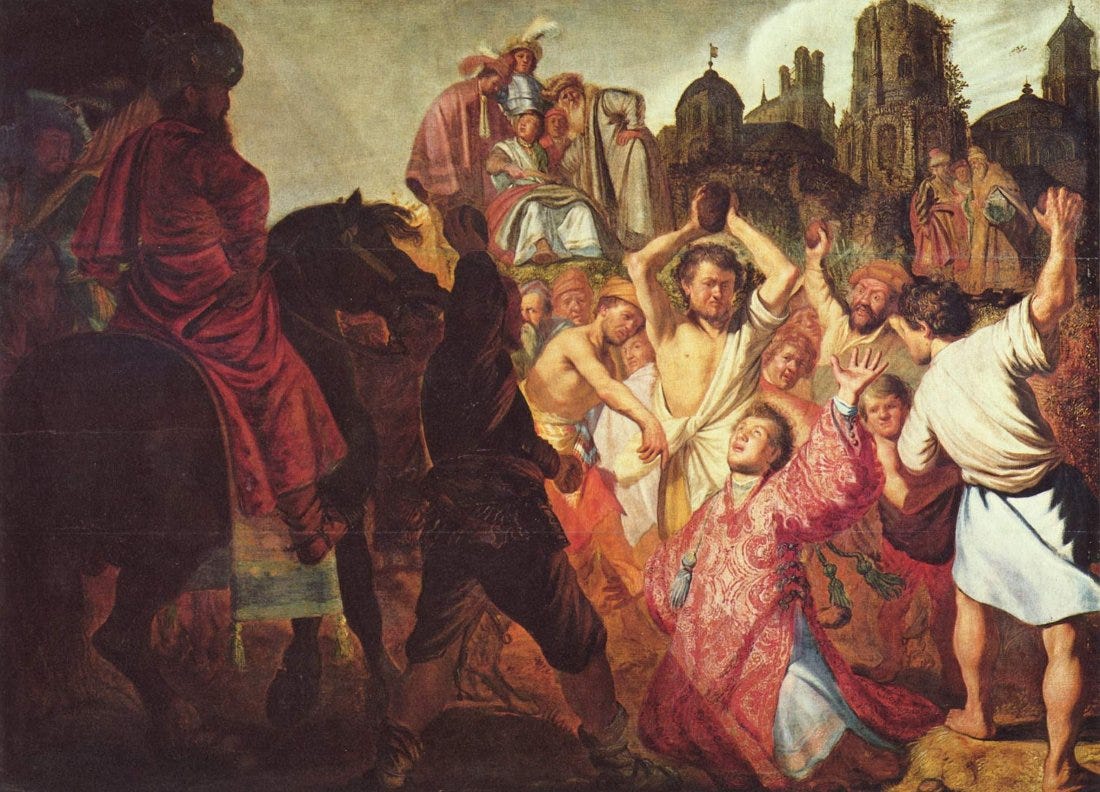On this the Ninth Day of Christmas and Octave of St Stephen the Protomartyr1, we ask you to join us in this Novena to our Patron Saint, St John the Apostle. This Novena will conclude on the final day of the Octave of St John the Apostle.
My most loving Saint, St. John the Apostle, behold me kneeling at thy feet, beseeching thee with all the affection of my heart to grant me thy special protection, particularly when in danger of offending God. O my dear and holy advocate, remember me before the throne of the most holy Trinity, and obtain for me from the infinite goodness of God, the virtues of humility, purity, obedience, and the grace to fulfill exactly the duties of my state.
Our Father, Hail Mary, Glory
II. O my dear Saint, St. John the Apostle, I renew to the Lord, through thee, the holy resolutions which I have frequently made of intending to love and serve Him faithfully. I am resolved to detach myself from every earthly thing, and I desire ardently to unite myself to Him, as my first beginning, last end, and sovereign good. My dear Saint, I beseech thee to offer to the most holy Trinity the sacrifice of my whole being, particularly of my judgment and will, in order to conform fully to God most holy, because I desire nothing else besides His grace and His holy love.
Our Father, Hail Mary, Glory
III. My sweet and holy Protector, St. John the Apostle, behold me again full of love for thee and full of confidence, beseeching thee to cast thyself on thy knees before the throne of the most holy Trinity, and entreat most ardently that God, through His infinite goodness, may grant me the grace to fly sin, and the gift of final perseverance. Thou knowest, O my dear St. John the Apostle, how great are the temptations to which man is subject, and how continual are the perils I run of being lost; do thou assist me with thy efficacious prayers.
Our Father, Hail Mary, Glory
Every child, that has received some instruction, will immediately answer to the question: "Who is the disciple of whom it is written: This is the disciple whom Jesus loved?" It is St. John the Evangelist. He is deserving of this name, as is proven by the numerous favors by which Christ distinguished him from all the Apostles.
Last year we saw that we, too, as children of the Church, enjoy so many and such marked graces--which divine Providence through Christ has conferred upon us in preference to so many others--that it may well be said of us, that Jesus loves us. But when we meditate upon the life of St. John, we may justly exclaim: Behold the disciple who loved Jesus; his whole life gave testimony of his love. And for us it will be of the greatest importance to imitate him in this respect. For, what would it have availed St. John, if Christ had granted him such great privileges, and treated him with such marked preference, if he had not reciprocated his Saviour's love, and had not co-operated with the graces received, and thereby sanctified his life!
Judas, too, received marvelous and numerous graces, in preference to so many others; but on this account his downfall was the more hideous, nay terrible, his ruin more sad. Judas wasted the graces which Christ effused into his heart; John made use of them. Let us today reflect upon this, and let it serve as a warning and encouragement for us.
O Mary, who hast loved St. John with a mother's love, obtain for us the true love of Jesus, and the grace to prove our love towards Him, by a reciprocation of His sacred love! I speak in the holy name of Jesus, to the greater honor of God!
Behold the disciple who loved Jesus! I say John was worthy of this encomium. And why? We shall find our answer in considering the characteristic marks by which true love manifests itself.
Love is an emotion of the heart, which, like all other sensations, can not be described. If a person has not experienced this feeling, no one will be able to explain it to him; and if he has experienced it, he will need no further explanation. Every child has affection for its mother, and the feelings which an affectionate child entertains, it will manifest by its exterior demeanor, although it can not, as yet, give utterance to it.
Do you love Jesus? Ask of your heart when you mention His holy name. We are told that St. Augustine was wont to say: "I relish nothing in this world that does not come in connection with the holy name of Jesus." And St. Bernard, after pronouncing this holy name, felt as if honey had touched his lips. If this be true of the saints, in consideration of what Christ had done for them, and in remembrance of the tokens of love which they had received from Him, what must have been the emotions of St. John, the disciple of love, when remembering Jesus with whom he had associated, on whose bosom he reclined at the institution of the sacrament of love! He was so intimate with Jesus, and received such numerous proofs of Christ's love for him.
Child of the Church, what does your heart feel when you pronounce the sweet name of Jesus--when you think of Him? By this, judge of the sincerity of your love towards Him.
The second mark of sincere love, is the care with which we strive not to offend the one beloved. How far removed from every stain of sin was St. John! There is no communion between Belial and Christ, between sin and Christ. Of course, even holy souls are not certain of never committing an imperfection. But we might piously believe that, after St. John was called by Christ, no stain of sin defiled his soul. O man! redeemed by Christ, does your conscience testify that you never defile it by any venial sin?
Which is the third characteristic of true love? It is the desire to do what we know will be agreeable to the loved one, and what will be a source of pleasure to him. Hence the great desire of St. Teresa to accomplish all things in the most perfect manner possible, thereby to render herself more pleasing to Jesus. "But this," says St. Paul, "this is the holy will of God--your sanctification;" and to attain it we must follow the example of Christ, and imitate Him, in accordance with the assurance of St. Paul: "For whom He foreknew, He also predestinated to be made conformable to the image of His Son"
"Learn of me." This exhortation of the Sacred Heart is addressed to all, who, as children of the Church, know Jesus, and call upon His holy name, and profess their belief in Him. "Be my followers, as I have been a follower of Christ," thus St. Paul might well affirm; and with equal justice might St. John have thus expressed himself,--he who beheld Jesus with his own eyes, and who had His divine example constantly before him, and for a still longer period beheld the reflection of the same in the virtuous life of the Blessed Virgin.
How like His divine Master must St. John have become, and how gloriously he testified his love for Christ during his whole life! Redeemed mortal, what does your conscience say to this? Is this your desire, to sanctify your life for the love of Jesus? Is this the earnest wish of your heart? Question your life. If so, then indeed your love for Christ is sincere.
How is true love proven? I reply: By the care we take not only to please the one loved, to agree to all his wishes, to assist him, to protect his goods and property, and aid not only him, but also those who are related to him by ties of love, friendship, or kindred.
I make the application and say: If our love for Jesus is genuine, it must manifest itself by the care we take to extend His kingdom on earth, and by the interest we take in the spiritual and temporal welfare of those, for whom Christ came into this world, and for whom He offered His life. It is the fire of holy zeal which must burn within us, an eagerness to spread the faith all over the world, to practise the corporal and spiritual works of mercy in behalf of our neighbor.
John was an Apostle, and how zealously and faithfully he fulfilled the duties of his vocation! We are told that, when well nigh one hundred years of age he continued to address the people, and continually exhorted them to mutual love. But the fervor and fidelity of our love proves itself best by our willingness to make any sacrifice, even that of life itself, for the one loved. It was in this manner that St. John proved his love for Christ; for, during the reign of the tyrant Domitian, he was cast into a caldron of seething oil, and he would have thus sacrificed his life, if he had not been preserved by a miracle.
Although we have not the opportunity of testifying our love for Christ by a bloody martyrdom, still we have sufficient occasion to manifest this love for our Redeemer by patience and resignation to the will of God. The caldron filled with seething oil, admonishes us not to let pass those precious opportunities that are offered us, of suffering with St. John an unbloody martyrdom, and thus showing our love for Jesus. This caldron of seething oil can be for you poverty, calumny, and the injuries which are heaped upon you, the diseases which you may have to bear. By persevering and conquering, your love for Jesus will be manifest.
But the surest pledge of our love for Christ, will be the supreme veneration we pay to Him in the Blessed Sacrament; here He is really present as God and man. Who will have felt this more than St. John? What recollections fraught with heavenly consolation must have filled his soul during his whole life, and with what ardor was he inflamed when he offered the Holy Sacrifice of Mass, or when he bowed down before the Blessed Sacrament!
Devotion to our Lord in the Blessed Sacrament is the best means of ascertaining the degree of our love for Jesus. Let us herein follow the example of St. John,--of the disciple who loved Jesus! Amen!2by Father Francis Xavier Weninger, 1876
JANUARY 2ND
ON BEGINNING A NEW LIFE WITH A NEW YEAR
Consider first, how many years of your life are now past and gone; how long it is since you first came to the knowledge of good and evil; and in what manner you have spent all this precious time, given you for no other end but that you might employ it in the love and service of your God, and in securing the salvation of your immortal soul. Alas! have any of these past years been spent in such a manner as to answer this great end? Is not that one and only business for which you came into the world, still to be begun? Have not all these years, which one after another have flowed away into the gulf of eternity, been utterly lost to your souls? It is well if they have not; considering how soon the greatest part of Christians, after their coming to the use of reason, fall from the grace of their baptism; how quickly they gave themselves up to follow the bent of their corrupt inclinations and passions; and in what a forgetfulness of God they generally pass their days. Ah! my soul, what a sad thought it would be, if during all these years thou hast hitherto lived, instead of storing up provisions for a happy eternity, thou hast been only 'treasuring up to thyself wrath against the day of wrath!'
Consider secondly, the present state and condition of your conscience. What is your life at present? How stand accounts between your soul and God? What would you think, if this day you were to be called to the bar of divine justice? Would you not earnestly desire a delay? alas! how few live in the manner in which they would be glad to be found, when death shall overtake them! and yet they are not ignorant, that death generally comes when least expected, and that, generally speaking, as men live, so they die. Ah! my soul, deceive not thyself, not suffer thyself to be imposed upon by the enemy. Thy time, to all appearance, will be much shorter than thou art willing to think; this very year perhaps may be thy last; it will certainly be so to many thousands, who expect it as little as thyself. Set, then, thy house in order now; begin this very day to rectify the whole state of thy interior, and live henceforward as thou desirest to die. There cannot be so great a security where eternity is at stake.
Consider thirdly, that the mercy of God has borne with you for so many years past, and, notwithstanding all the provocations of your repeated crimes and perpetual ingratitude, has brought you now to the beginning of this New Year, out of a sincere desire, that now at least you might begin a new life, and such a life as might secure to your soul that true life which never ends. You have been, alas! like the barren 'fig-tree, planted in his vineyard,' which hitherto is willing to try once more, in hopes of our doing better for the future. But, O take care to disappoint him no more, by refusing him the fruits he expects of a thorough amendment of life, lest he pass an irrevocable sentence, for the barren tree to be cut down, and cast into the fire.
Conclude to begin, from this very hour, to turn away from sin; and to dedicate yourselves henceforward in good earnest to the love and service of your God. Alas! how few Christians seem to be truly in earnest in this greatest of all concerns, where their all is at stake for eternity.3
— Bishop Richard Challoner
https://sensusfidelium.com/the-liturgical-year-dom-prosper-gueranger/january/january-2-octave-of-st-stephen-the-first-martyr/
https://www.catholicharboroffaithandmorals.com/Sermons%20Octave%20of%20St.%20John%20the%20Apostle%20and%20Evangelist.html
https://liturgialatina.org/challoner/jan1.htm#1








